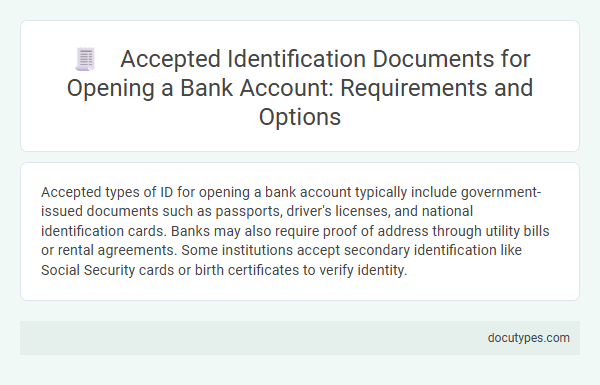Accepted types of ID for opening a bank account typically include government-issued documents such as passports, driver's licenses, and national identification cards. Banks may also require proof of address through utility bills or rental agreements. Some institutions accept secondary identification like Social Security cards or birth certificates to verify identity.
Overview of Identification Requirements for Bank Accounts
Opening a bank account requires valid identification to verify your identity and comply with legal regulations. Banks accept specific types of ID to ensure security and prevent fraud.
- Government-Issued Photo ID - Common forms include passports, driver's licenses, and state ID cards which provide official proof of identity.
- Proof of Address - Utility bills, lease agreements, or bank statements are often required to confirm your residential address.
- Social Security Number or Tax Identification Number - These numbers are used to verify your identity and for tax reporting purposes.
Why Banks Require Identification Documents
Banks require identification documents to verify the identity of account holders and prevent fraud. Commonly accepted IDs include government-issued passports, driver's licenses, and national identity cards. These documents ensure compliance with anti-money laundering regulations and secure the banking system.
Primary Forms of Acceptable Identification
What types of ID are accepted for opening a bank account? Primary forms of acceptable identification typically include government-issued documents such as a passport or a driver's license. These IDs must be valid and contain a photo, full name, and date of birth to verify the account holder's identity effectively.
Secondary Identification Documents Accepted by Banks
Secondary identification documents provide additional verification when opening a bank account. These documents supplement primary IDs to ensure identity authenticity and comply with banking regulations.
Common secondary IDs include utility bills, bank statements, and social security cards. Banks may also accept student IDs, employee IDs, and government-issued documents as proof of identity or residence.
Government-Issued IDs: Standards and Validity
Government-issued IDs are essential for verifying your identity when opening a bank account. Banks require these IDs to meet specific standards and maintain validity to comply with legal regulations.
- Standardized Format - Government-issued IDs must follow a uniform design that includes security features like holograms and barcodes to prevent fraud.
- Current Validity - Only IDs that are unexpired and officially recognized by the issuing authority are accepted by banks for account openings.
- Authorized Issuers - Accepted IDs include passports, state or national driver's licenses, and government identity cards issued by recognized agencies.
Requirements for Non-Citizens and Foreign Nationals
Accepted types of ID for opening a bank account typically include government-issued identification such as passports, national ID cards, and driver's licenses. Non-citizens and foreign nationals often need to provide additional documents to meet bank requirements.
Non-citizens must present valid passports and often a visa or residence permit to verify their legal status. Banks may also require proof of address, such as a utility bill or rental agreement, to confirm residency. Some financial institutions request a Tax Identification Number (TIN) or Social Security Number (SSN) for tax reporting purposes.
Special Considerations for Minors and Students
Accepted types of ID for opening a bank account typically include government-issued photo identification such as a passport, driver's license, or national ID card. Special considerations apply for minors and students, who may need to provide a birth certificate, student ID, or a parent or guardian's consent along with their identification. Financial institutions often require proof of address and sometimes social security numbers or tax identification numbers to complete the account setup for these groups.
Digital and Electronic Identification Options
Digital and electronic identification options have become widely accepted for opening bank accounts, streamlining the verification process. Common methods include eID cards, mobile ID applications, and biometric authentication technologies.
These digital IDs provide secure, fast, and convenient verification without the need for physical documents. Banks often support government-issued electronic IDs and validated digital identity platforms to comply with Know Your Customer (KYC) regulations.
Common Identification Rejection Reasons
| Type of ID Accepted | Description | Common Rejection Reasons |
|---|---|---|
| Passport | Government-issued international travel document with photo and personal details. | Expired document, damaged or altered passport, or inconsistent personal information. |
| Driver's License | Official card issued by motor vehicle authorities with photo ID and address. | Invalid or expired license, lack of photo, or mismatched address details. |
| State ID Card | Non-driver photo ID issued by state government for identification purposes. | Expired card, poor image quality, or altered information. |
| Social Security Card | Document issued by Social Security Administration showing your SSN. | Missing photo ID when required, or photocopies instead of originals. |
| Birth Certificate | Official record of birth issued by governmental authority. | Non-certified copies, illegible print, or lack of accompanying photo ID. |
| Military ID | Issued to active or retired military personnel with photo and personal details. | Expired card, incomplete information, or damage preventing verification. |
| Permanent Resident Card (Green Card) | Proof of legal permanent residency status in the country. | Expired card, counterfeit documents, or inconsistent personal details. |
| Immigration Documents | Includes visas, work permits, or other government-issued proof of legal status. | Invalid or expired documents, insufficient information, or poor document quality. |
| Reasons for Rejection Summary | Common issues include expired or damaged IDs, inconsistent personal information, lack of photo or signature where required, submission of photocopies instead of originals, or failure to meet specific bank requirements. Ensuring your ID is current, clear, and consistent improves the chances of approval. | |
What Types of ID Are Accepted for Opening a Bank Account? Infographic

